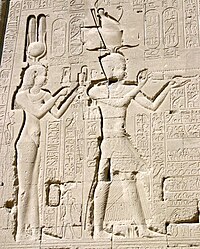JULIUS CAESAR -CLEOPATRA SON CAESARION EXECUTED ON THE ORDER
OF OCTAVIAN AUGUST 23,30B.C
"Too many Caesars is not good"
Arius Didymus

Ptolemy XV Philopator Philometor Caesar
Latin: Ptolemaeus XV Philopator Philomētor Caesar;
June 23, 47 BC – August 23, 30 BC),
better known by the nicknames Caesarion (/sᵻˈzæriən/; English: Little Caesar; Latin: Caesariō) and Ptolemy Caesar (/ˈtɒlᵻmi ˈsiːzər/; Greek: Πτολεμαῖος Καῖσαρ, Ptolemaios Kaisar; Latin: Ptolemaeus Caesar), was the last Pharaoh of Egypt.
He was the final member of the Ptolemaic dynasty of Egypt, who reigned jointly with his mother Cleopatra VII of Egypt, from September 2, 44 BC. He held the position of sole ruler between the death of Cleopatra, on August 12, 30 BC, up to August 23, 30 BC,
the time his death was ordered by Octavian, who would become the Roman emperor Augustus. It is unknown whether Octavian's order was carried out successfully. He was the eldest son of Cleopatra VII, and possibly the only biological son of Julius Caesar, after whom he was named.
Life[edit]
Caesarion was born in Egypt on June 23, 47 BC. His mother Cleopatra insisted that he was the son of Julius Caesar. Caesarion was said to have inherited Caesar's looks and manner, but Caesar apparently did not officially acknowledge him.
Caesar's supporter Gaius Oppius wrote a pamphlet which attempted to prove that Caesar could not have fathered Caesarion. Nevertheless,
Caesar may have allowed Caesarion to use his name.
[1] The matter became contentious when Caesar's adopted son Octavian came into conflict with Cleopatra.
CAESARION IN ROME
Caesarion spent two of his infant years, from 46 to 44 BC, in Rome, where he and his mother were Caesar's guests. Cleopatra hoped that her son would eventually succeed his father as the head of the Roman Republic as well as of Egypt. After Caesar's assassination on March 15, 44 BC,
Cleopatra and Caesarion returned to Egypt. Caesarion was named co-ruler by his mother on September 2, 44 BC at the age of three, although he was pharaoh in name only, with Cleopatra keeping actual authority all to herself. Cleopatra compared her relationship to her son with the Egyptian goddess Isis and her divine child Horus.[1]
During the tense period leading up to the final conflict between Mark Antony (Marcus Antonius) and Octavian (future Emperor Augustus), the two of them initially shared control of the Republic in a triumvirate with Lepidus. Lepidus was forced into retirement by Octavian in 36 BC. Octavian and Mark Antony were then left in control of the Western and Eastern provinces respectively.
There is no historical record of Caesarion between 44 BC until the Donations of Antioch in 36 BC. Two years later he also appears at the Donations of Alexandria.
Cleopatra and Antony staged both "Donations" to donate lands dominated by Rome and Parthia to Cleopatra's children: the 11-year-old Caesarion (fathered by Julius Caesar) and the four year-old twins Alexander Helios and Cleopatra Selene II initially in 36 BC, and in 34 BC including the two year-old Ptolemy Philadelphus (all three fathered by Marc Antony). Octavian gave public approval to the Donations of Antioch in 36 BC, which have been described as an Antonian strategy to rule the East making use of Cleopatra's unique royal Seleucid lineage in the regions donated.[2]
In 34 BC, Antony granted further eastern lands and titles to Caesarion and to his own three children with Cleopatra in the Donations of Alexandria. Caesarion was proclaimed to be a god, a son of [a] god, and "King of Kings".
This grandiose title was "unprecedented in the management of Roman client-king relationships" and could be seen as "threatening the 'greatness' of the Roman people".[3] Antony also declared Caesarion to be Caesar's true son and heir. This declaration was a direct threat to Octavian (whose claim to power was based on his status as Julius Caesar's grandnephew and adopted son). These proclamations partly caused the fatal breach in Antony's relations with Octavian, who used Roman resentment over the Donations to gain support for war against Antony and Cleopatra.[4]
After the defeat of Antony and Cleopatra at the Battle of Actium in 31 BC, Cleopatra seems to have groomed Caesarion to take over as "sole ruler without his mother."[1] She may have intended to go into exile, perhaps with Antony, who may have hoped that he would be allowed to retire as Lepidus had.
Caesarion reappears in the historical record in 30 BC, when Octavian invaded Egypt and searched for him. Cleopatra may have sent Caesarion, at the time 17 years old, to the Red Sea port of Berenice for safety, possibly as part of plans for an escape to India; he may have been sent years earlier, but the sources are unclear. Plutarch does say that Caesarion was sent to India, but also that he was lured back by false promises of the kingdom of Egypt:
Caesarion, who was said to be Cleopatra's son by Julius Caesar, was sent by his mother, with much treasure, into India, by way of Ethiopia. There Rhodon, another tutor like Theodorus, persuaded him to go back, on the ground that [Octavian] Caesar invited him to take the kingdom.[5]
Octavian captured the city of Alexandria on August 1, 30 BC, the date that marks the official annexation of Egypt to the Roman Republic. Around this time Mark Antony and Cleopatra died, traditionally said to be by suicide though murder has been suggested.[6] Details of the narratives in Plutarch are generally challenged and not taken literally.[7] Caesarion's guardians, including his tutor, either were themselves lured by false promises of mercy into returning him to Alexandria or perhaps even betrayed him; the records are unclear.
Octavian is supposed to have had Pharaoh Caesarion executed in Alexandria, following the advice of Arius Didymus, who said "Too many Caesars is not good"








No comments:
Post a Comment